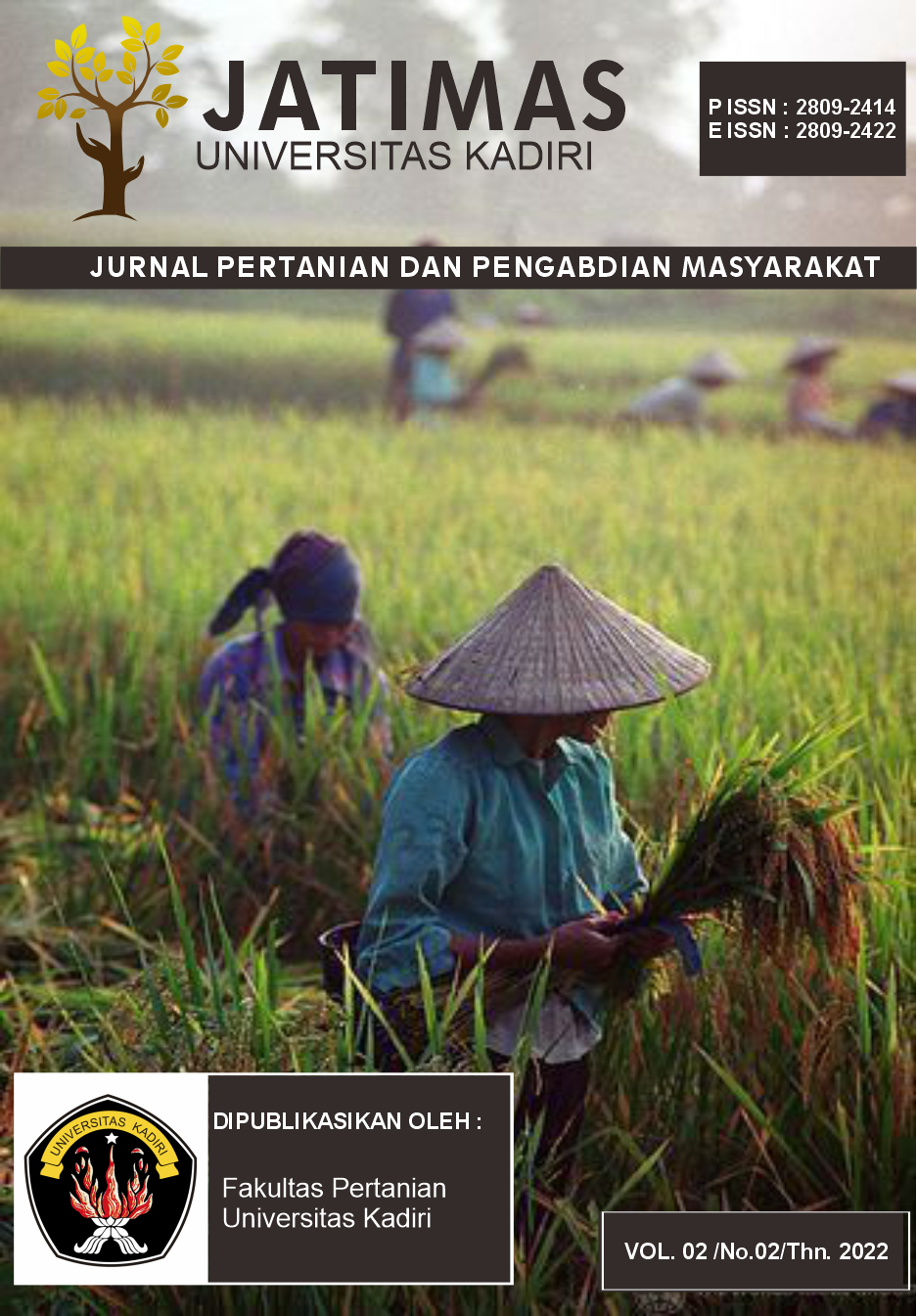Sosialisasi Minat Pertanian Untuk Mewujudkan Ketahanan Pangan Di SD Negeri Banjarejo, Kecamatan Ngadiluwih, Kabupaten Kediri
DOI:
https://doi.org/10.30737/jatimas.v2i2.3484Keywords:
Agriculture, Socialization, StudentAbstract
The tropical climate gives Indonesia sunshine all around, which has the potential for agricultural development. In line with the development of time, there has been a change in land use from agricultural land to non-agricultural land. Land use changes occur due to an increase in high population and rapid growth in the economic sector. The impact of land conversion is a decrease in food production which can cause food imports to occur. Land conversion impacts economic changes and the composition of labor requirements. Many young people are not interested in working in the agricultural sector and prefer to work in the service sector. The efforts to invite people back to work in the farming sector by socializing the introduction of the farm industry from an early age. The socialization was carried out at Banjarejo Public Elementary School, Ngadiluwih District, Kediri. The socialization target was elementary school students in grades 4, 5, and 6. The socialization method was direct practice related to eggplant and tomato cultivation. The socialization materials included an introduction to the world of agriculture, the practice of direct planting of eggplant and tomatoes, and socialization on the use of organic and inorganic waste. Banjarejo Public Elementary School students were enthusiastic in practicing eggplant and tomato cultivation.
Â
Iklim tropis membuat Indonesia mendapatkan sinar matahari sepanjang tahun, hal ini berpotensi baik untuk perkembangan pertanian. Sejalan dengan berkembangnya waktu, terjadi alih fungsi lahan dari lahan pertanian ke non-pertanian. Alih fungsi lahan terjadi karena peningkatan pertumbuhan penduduk yang tinggi serta pertumbuhan sektor ekonomi yang cepat. Dampak alih fungsi lahan adalah menurunnya produksi pangan yang dapat menyebabkan terjadi impor bahan pangan. Alih fungsi lahan berdampak pada perubahan ekonomi dan perubahan komposisi kebutuhan tenaga kerja, banyak masyarakat usia muda tidak tertarik bekerja di sector pertanian dan lebih memilih bekerja di sektor jasa. Upaya untuk mengajak kembali masyarakat bekerja dibidang pertanian dengan cara sosialisasi pengenalan sektor pertanian sejak usia dini. Pelaksanaan sosialisasi dilaksanakan di SD Negeri Banjarejo, Kecamatan Ngadiluwih, Kediri. Target sosialiasasi adalah siswa sekolah dasar kelas 4, 5 dan 6. Metode sosialisasi yang digunakan yaitu praktik secara langsung terkait budidaya tanaman terong dan tomat. Materi sosialisasi meliputi, pengenalan dunia pertanian, praktik penanaman langsung tanaman terong dan tomat serta sosialisasi pemanfaatan sampah organik dan anorganik. Murid-murid SD Negeri Banjarejo sangat antusias saat praktik langsung budidaya tanaman Terong dan Tomat.
References
BPS. 2022. Statistik Pemuda Indonesia 2020. Jakarta. Indonesia. Badan Pusat Statistik.
Dedi Herawadi. (2020). Struktur Fungsi & Metabolisme Tubuh Tumbuhan. Bandung:SEAMEO QITEP in Science.
Hijriati, P. R. (2021). Proses Belajar Anak Usia 0 Sampai 12 Tahun Berdasarkan Karakteristik Perkembangannya. Bunayya : Jurnal Pendidikan Anak, 7(1), 152.
https://doi.org/10.22373/bunayya.v7i1.9295
Marliani, Novi. 2014. Pemanfaatan Limbah Rumah Tangga (sampah Anorganik) Sebagai Bentuk Implementasi Dari Pendidikan Lingkungan Hidup. Jurnal Formatif 4(2):124-132
Meiriani, Handrian, & Haryati. (2013). Peningkatan Kadar Vitamin C Buah Tomat (Lycopersicum esculentum MILL.) Dataran Rendah Dengan Pemberian Hormon GA3. Jurnal Online Agroekoteknologi, 2(1), 333–339.
Nisa, K., & Surbakti, E. S. B. (2016). Tomat ( Lycopersicum esculentum Mill .) sebagai Anti Penuaan Kulit Tomato ( Lycopersicum esculentum Mill .) As Anti Aging Skin. Majority, 5(3), 73–78.
Pennypacker, B.W, K.T. LEATHI, W.L. STOUT, and R.R HILL JR. 1990. Technique for simulating field drought stress in the garden house. Agr.J. 82(5): 951-957.
Thoriq, A., & Fauzan, I. (2017). Edukasi Teknologi Pertanian Untuk Anak Usia Dini Di Desa Cilayung, Kecamatan Jatinangor. Aplikasi Iptek Untuk Masyarakat, 6(1), 18–20. Retrieved from http://www.pendidikankarakter.com/
Wardianingsih, R., & Sirait, R. (2021). Inisiasi Regenerasi Petani. Buletin APBN , VI, 12–15.
Wasito, M., Hakim, T., Lardi, S., & Lubis, N. (2022). Agribisnis Budidaya Tanaman Terong Ungu. Bekasi: PT Dewangga Energi Internasional.
Downloads
Published
Issue
Section
License
Authors who publish in this journal agree to the following terms:
- Authors retain copyright with the work simultaneously licensed under a Creative Commons Attribution License (https://creativecommons.org/licenses/by-nc-nd/4.0/) that allows others to share the work with an acknowledgement of the work's authorship. Permitted third-party reuse is defined by the Creative Commons Attribution-NonCommercial-NoDerivs (CC BY-NC-ND). This permission allows users to copy and distribute the Article, provided this is not done for commercial purposes and further does not permit distribution of the Article if it is changed or edited in any way, and provided the user gives appropriate credit (with a link to the formal publication through the relevant DOI), provides a link to the license, and that the licensor is not represented as endorsing the use made of the work.
- Authors are able to enter into separate, additional contractual arrangements for the non-exclusive distribution of the journal's published version of the work (e.g., post it to an institutional repository or publish it in a book).
- Authors are permitted and encouraged to post their work online (e.g., in institutional repositories or on their website) prior to and during the submission process, as it can lead to productive exchanges, as well as earlier and greater citation of published work.
Deprecated: json_decode(): Passing null to parameter #1 ($json) of type string is deprecated in /home/ojs.unik-kediri.ac.id/public_html/plugins/generic/citations/CitationsPlugin.php on line 68



